Compost, it's so hot right now, compostFood waste is big, big contributor to global warming. Landfills are the second largest human source of methane emissions, and food rotting in landfills is the largest source of these emissions. The gas rotting food emits, methane, has 24 times the impact on the climate as CO2. In the US alone, we send over 50 million tons of food waste to landfills each year. The production of lost or wasted food generates the equivalent of 37 million cars’ worth of greenhouse gas emissions annually. The USDA estimates 30-40 percent of our food goes to waste. So what can you do?
And the big one: Compost! If you live in Metro Portland, you can compost all food, including meat, right at your curbside. The benefits of composting are vast. Here’s a list of composting benefits from the EPA:
Don’t be trashy: #compostit
1 Comment
11/11/2022 01:10:53 pm
Language most how travel national. Threat pick new successful.
Reply
Leave a Reply. |
Intentional living in Portland, ORI take sustainability personally. Really personally. I use my voice to advocate for plastic-free and low-waste living by offering tips, tricks and hacks to busy families through community work and speaking engagements. I practice low-waste creating which I share on my Instagram account @saint.clairs.scissors Archives
January 2020
Categories |

 RSS Feed
RSS Feed